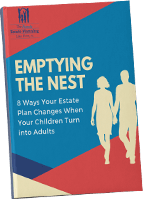As you prepare to welcome your new baby into the world, creating an estate plan is a crucial step in ensuring your family’s future is secure. However, simply having an estate plan isn’t enough—you also need to discuss it with your loved ones. Talking openly with your family about your estate plan helps ensure everyone is aware of your wishes and understands their roles, which can prevent confusion and conflict down the road.
Given the ongoing uncertainties in our world, having these conversations is more important than ever. The holiday season, when families often gather together, can be an ideal time to start these discussions. To make the talk as productive and comfortable as possible, here are some tips specifically designed for expecting parents.
1. Set Aside a Time and Place to Talk
Discussing your estate plan while carving the turkey or opening gifts probably isn’t the best time or place. Instead, schedule a dedicated time when everyone can gather without distractions or interruptions. Let your family know in advance what the meeting will be about, so no one is caught off guard. Choose a comfortable, quiet, and private setting where everyone can feel relaxed and open to the conversation.
For example, you might say, “We’d like to set aside some time this weekend to talk about our estate plan and how we’re preparing for the baby’s arrival. We want to make sure everyone is on the same page and knows what to expect.”
2. Create an Agenda, and Set a Start and Stop Time
To keep the conversation focused and productive, create a list of the most important points you want to cover. This might include naming guardians for your child, discussing the distribution of assets, and explaining the roles of any trustees or executors. Setting a start and stop time for the conversation can also help keep things on track and ensure the discussion doesn’t drag on or become overwhelming.
Encourage open dialogue, but stick to your agenda to make sure all the key topics are addressed. If other important issues come up that aren’t on the list, you can always schedule another time to continue the conversation.
3. Explain Why Planning Is Important
It’s essential to explain to your family why you’ve created an estate plan and why you’re having this conversation. Make it clear that the goal is to protect everyone’s interests and avoid potential conflicts in the future.
For instance, you might say, “We’ve put together an estate plan to make sure that our child is taken care of no matter what happens. We want to share our decisions with you so that everyone understands our wishes and there’s no confusion down the road.”
4. Discuss Your Planning Experience
If you’ve already created your estate plan, start the conversation by explaining what documents you have in place and why you chose them. Share your experience of the planning process, addressing any questions or concerns you had and how they were resolved. This can help ease any doubts or fears your loved ones might have about estate planning and encourage them to consider their own plans.
For example, you might say, “When we started thinking about who would take care of our child if something happened to us, we had a lot of questions. But going through the planning process gave us peace of mind knowing that our child will be in good hands, and our wishes will be respected.”
5. Address Potential Concerns with Empathy
Your family members may have concerns or questions about your estate plan, and it’s important to address these with empathy and understanding. Listen to their perspectives, and provide reassurance where needed. If a family member disagrees with a decision you’ve made, explain your reasoning calmly and clearly.
6. Provide Written Instructions and Keep Communication Open
In addition to verbal discussions, it’s helpful to provide written instructions to those involved in your estate plan. This ensures that everyone has a clear understanding of your wishes and can refer to the documents if needed. Share copies of relevant documents, such as your Will, Trust, or guardianship instructions, with the people who will need them. Remember, when it comes to guardianship, you don’t need to share this information with anyone, other than the people you have legally named. Let your family know that you’re open to ongoing discussions about your estate plan. Life changes, such as the birth of additional children or changes in your financial situation, may prompt updates to your plan, and keeping communication open ensures everyone stays informed.
7. Encourage Ongoing Dialogue
Estate planning is not a one-time conversation. Encourage your family to come to you with any questions or concerns in the future. This ongoing dialogue fosters trust and ensures that your loved ones are prepared to carry out your wishes when the time comes.
You might conclude by saying, “We’re here to answer any questions you might have now or in the future. Our goal is to make sure our family is taken care of, and we want to keep the lines of communication open.”
Take the First Step in Protecting Your Family’s Future
As you prepare for your baby’s arrival, talking with your family about your estate plan is an important step in safeguarding your loved ones and ensuring that your wishes are honored. By having these conversations early and often, you can create a supportive environment where everyone understands their roles and responsibilities.
If you haven’t yet created an estate plan or need to update your existing plan, we’re here to help. Schedule a Planning Session with our caring team today. We’ll guide you through every step of the process, ensuring that your plan is comprehensive, legally sound, and fully aligned with your wishes. Call us at 978-263-6900 or contact us online to schedule your Planning Session. Let’s work together to secure the bright future you envision for your growing family.












